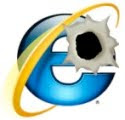บทความโดย: Thai Windows Administrator Blog
[21 ม.ค. 53: ไมโครซอฟท์ประกาศว่าจะออกแพตซ์เพื่อแก้ปัญหาช่องโหว่ความปลอดภัยนี้ในวันที่ 21 มกราคม 2553 ซึ่งตรงกับวันที่ 22 มกราคม 2553 ตามเวลาในประเทศไทย]
[ข้อสังเกต:
ไมโครซอฟท์ออก Microsoft Security Advisory (979352): Vulnerability in Internet Explorer Could Allow Remote Code Execution เพื่อประกาศว่ามีช่องโหว่ความปลอดภัยร้ายแรง (Critical) ในโปรแกรม Internet Explorer 6 SP1 บน Windows 2000 SP4 และ Internet Explorer 6, Internet Explorer 7 และ Internet Explorer 8 บน Windows XP, Windows Server 2003, Windows Vista, Windows Server 2008, Windows 7 และ Windows Server 2008 R2 ซึ่งแฮ็คเกอร์สามารถใช้เป็นช่องทางในการโจมตีระบบแบบ "Remote Code Execution" ได้
ช่องโหว่ความปลอดภัยนี้เกิดจากการทำงานผิดพลาดของพ้อยน์เตอร์ (Pointer) ในโปรแกรม Internet Explorer ส่งผลให้สามารถเข้าถึงออปเจ็กต์ที่ถูกลบออกจากระบบไปแล้วได้ ซึ่งแฮ็คเกอร์อาจใช้เป็นช่องทางในการโจมตีระบบโดยการหลอกให้ผู้ใช้ดาวน์โหลดไฟล์ HTML ซึ่งมีโค้ดประสงค์ร้ายแฝงอยู่ เมื่อผู้ใช้โหลดไฟล์ดังกล่าวโดยใช้โปรแกรม Internet Explorer เวอร์ชันที่มีผลกระทบ แฮ็คเกอร์ก็จะสามารถรันโค้ดจากระยะไกลได้หรืออาจทำให้เกิดสถานะการปฏิเสธการให้บริการ (Denial-of-Service: DoS) ได้
ปัจจุบัน ไมโครซอฟท์กำลังทำการตรวจสอบสถานการณ์และติดตามช่องโหว่นี้อย่างใกล้ชิด โดยมีรายงานการโจมตีระบบผ่านทางช่องโหว่นี้บน Internet Explorer 6 แล้ว นอกจากนี้ไมโครซอฟท์ได้เปิดเว็บไซต์ Microsoft Active Protections Program (MAPP) และเว็บไซต์ Microsoft Security Response Alliance (MSRA) เพื่อเป็นศูนย์ข้อมูลสำหรับช่วยเหลือลูกค้า
สำหรับการออกแพตช์ (Patch) เพื่อปิดช่องโหว่นั้น ไมโครซอฟท์ประกาศว่าหลังทำการตรวจสอบเสร็จเรียบร้อย จะทำการแจ้งให้ผู้ใช้ทราบอีกครั้ง โดยในกรณีที่จำเป็นต้องออกแพตช์เพื่อปิดช่องโหว่ อาจจะออกแพตช์รวมอยู่ในเซอร์วิสแพ็ค (Service Pack) ซีเคียวริตี้อัพเดท (Security Update) หรือออกเป็นอัพเดทกรณีพิเศษ (Out-of-cycle Security Update) ในกรณีเกิดผลกระทบร้ายแรงมากๆ หรือได้รับการร้องขอจากลูกค้า หรือแบบอื่นๆ ตามความเหมาะสม
โปรแกรมที่ได้รับผลกระทบ
โปรแกรมที่ได้รับผลกระทบ มีดังต่อไปนี้
• Internet Explorer 6 SP1 on Microsoft Windows 2000 SP4
• Internet Explorer 6 for Windows XP SP2, Windows XP SP3, and Windows XP Professional x64 Edition SP2
• Internet Explorer 6 for Windows Server 2003 SP2, Windows Server 2003 with SP2 for Itanium-based Systems, and Windows Server 2003 x64 Edition SP2
• Internet Explorer 7 for Windows XP SP2 and Windows XP SP3, and Windows XP Professional x64 Edition SP2
• Internet Explorer 7 for Windows Server 2003 SP2, Windows Server 2003 with SP2 for Itanium-based Systems, and Windows Server 2003 x64 Edition SP2
• Internet Explorer 7 in Windows Vista, Windows Vista SP1, Windows Vista SP2, Windows Vista x64 Edition, Windows Vista x64 Edition SP1, and Windows Vista x64 Edition SP2
• Internet Explorer 7 in Windows Server 2008 for 32-bit Systems and Windows Server 2008 for 32-bit Systems SP2
• Internet Explorer 7 in Windows Server 2008 for Itanium-based Systems and Windows Server 2008 for Itanium-based Systems SP2
• Internet Explorer 7 in Windows Server 2008 for x64-based Systems and Windows Server 2008 for x64-based Systems SP2
• Internet Explorer 8 for Windows XP SP2, Windows XP SP3, and Windows XP Professional x64 Edition SP2
• Internet Explorer 8 for Windows Server 2003 SP2, and Windows Server 2003 x64 Edition SP2
• Internet Explorer 8 in Windows Vista, Windows Vista SP1, Windows Vista SP2, Windows Vista x64 Edition, Windows Vista x64 Edition SP1, and Windows Vista x64 Edition SP2
• Internet Explorer 8 in Windows Server 2008 for 32-bit Systems and Windows Server 2008 for 32-bit Systems SP2
• Internet Explorer 8 in Windows Server 2008 for x64-based Systems and Windows Server 2008 for x64-based Systems SP2
• Internet Explorer 8 in Windows 7 for 32-bit Systems
• Internet Explorer 8 in Windows 7 for x64-based Systems
• Internet Explorer 8 in Windows Server 2008 R2 for x64-based Systems
• Internet Explorer 8 in Windows Server 2008 R2 for Itanium-based Systems
โปรแกรมที่ไม่ได้รับผลกระทบ
โปรแกรมที่ไม่ได้รับผลกระทบ มีดังต่อไปนี้
• Internet Explorer 5.01 SP4 for Microsoft Windows 2000 SP4
คำแนะนำเพื่อป้องกันระบบจากการโจมตี
ในระหว่างที่รอการตรวจสอบและการพัฒนาแพตช์ (Patch) แล้วเสร็จ ไมโครซอฟท์ได้คำแนะนำผู้ใช้ Internet Explorer เวอร์ชันที่ได้รับผลกระทบให้ดำเนินการดังนี้
• ตั้งค่า Security Zone ของโซน "Internet และ Local intranet" เป็น "High" เพื่อป้องกันไม่ให้ ActiveX Controls และ Active Scripting ทำงานโดยอัตโนมัติ
• คอนฟิกให้ Internet Explorer แสดงพร็อมท์ก่อนทำการรัน Active Scripting หรือทำการปิดการทำงานของ Active Scripting ในโซน "Internet และ Local intranet"
• เปิดใช้งานฟีเจอร์ DEP สำหรับ Internet Explorer 6 Service Pack 2 หรือ Internet Explorer 7
แหล่งข้อมูลอ้างอิง
• KB979352
© 2010 TWA Blog. All Rights Reserved.

No comments:
Post a Comment
เชิญแลกเปลี่ยนความคิดเห็น ขอสงวนสิทธิ์ในการเผยแพร่ข้อความ HTML